-
January
-
February
- This Week in History: February 6-12 – Lesson
- This Week in History: February 6-12 – Quiz
- This Week in History: February 13-19 – Lesson
- This Week in History: February 13-19 – Quiz
- This Week in History: February 20-26 – Lesson
- This Week in History: February 20-26 – Quiz
- This Week in History: February 27-March 5 – Lesson
- This Week in History: February 27-March 5 – Quiz
-
March
- This Week in History: March 6-12 – Lesson
- This Week in History: March 6-12 – Quiz
- This Week in History: March 13-19 – Lesson
- This Week in History: March 13-19 – Quiz
- This Week in History: March 20-26 – Lesson
- This Week in History: March 20-26 – Quiz
- This Week in History: March 27-April 2 – Lesson
- This Week in History: March 27-April 2 – Quiz
-
April
- This Week in History April 3-9 – Lesson
- This Week in History April 3-9 – Quiz
- This Week in History: April 10-16 – Lesson
- This Week in History: April 10-16 – Quiz
- This Week in History: April 17-23 – Lesson
- This Week in History: April 17-23 – Quiz
- This Week in History: April 24-30 – Lesson
- This Week in History: April 24-30 – Quiz
-
May
- This Week in History: May 1 – 7 – Lesson
- This Week in History: May 1 – 7 – Quiz
- This Week in History: May 8 – 14 – Lesson
- This Week in History: May 8 – 14 – Quiz
- This Week in History: May 15 – 21 – Lesson
- This Week in History: May 15 – 21 – Quiz
- This Week in History: May 22-28 – Lesson
- This Week in History: May 22-28 – Quiz
- This Week in History: May 29-June 4 – Lesson
- This Week in History: May 29-June 4 – Quiz
-
June
- This Week in History: June 5 – 11 – Lesson
- This Week in History: June 5 – 11 – Quiz
- This Week in History: June 12-18 – Lesson
- This Week in History: June 12-18 – Quiz
- This Week in History: June 19-25 – Lesson
- This Week in History: June 19-25 – Quiz
- This Week in History: June 26 – July 2 – Lesson
- This Week in History: June 26 – July 2 – Quiz
-
July
- This Week in History: July 3 – 9 – Lesson
- This Week in History: July 3 – 9 – Quiz
- This Week in History: July 10 – 16 – Lesson
- This Week in History: July 10 – 16 – Quiz
- This Week in History July 17 – 23 – Lesson
- This Week in History July 17 – 23 – Quiz
- This Week in History – July 24-30 – Lesson
- This Week in History – July 24-30 – Quiz
- This Week in History: July 31 – August 6 – Lesson
- This Week in History: July 31 – August 6 – Quiz
-
August
- This Week in History: August 7-13 – Lesson
- This Week in History: August 7-13 – Quiz
- This Week in History: August 14 – 20 – Lesson
- This Week in History: August 14 – 20 – Quiz
- This Week in History: August 21 – 27 – Lesson
- This Week in History: August 21 – 27 – Quiz
- This Week in History: August 28 – September 3 – Lesson
- This Week in History: August 28 – September 3 – Quiz
-
September
- This Week in History: September 4 – 10 – Lesson
- This Week in History: September 4 – 10 – Quiz
- This Week in History: September 11 -17 – Lesson
- This Week in History: September 11 -17 – Quiz
- This Week in History: September 18 – 24 – Lesson
- This Week in History: September 18 – 24 – Quiz
- This Week in History: September 25 – October 1 – Lesson
- This Week in History: September 25 – October 1 – Quiz
-
October
- This Week in History: October 2-8 – Lesson
- This Week in History: October 2-8 – Quiz
- This Week in History: October 9 –15 – Lesson
- This Week in History: October 9 –15 – Quiz
- This Week in History: October 16–22 – Lesson
- This Week in History: October 16–22 – Quiz
- This Week in History: October 23–29 – Lesson
- This Week in History: October 23 –29 – Quiz
- This Week in History: October 30 – November 5 – Lesson
- This Week in History: October 30 – November 5 – Quiz
-
November
- This Week in History: November 6 – 12 – Lesson
- This Week in History: November 6 – 12 – Quiz
- This Week in History: November 13 – 19 – Lesson
- This Week in History: November 13 – 19 – Quiz
- This Week in History: November 20 – 26 – Lesson
- This Week in History: November 20 – 26 – Quiz
- This Week in History: November 27- December 3 – Lesson
- This Week in History: November 27- December 3 – Quiz
-
December
This Week in History: September 18 – 24 – Lesson
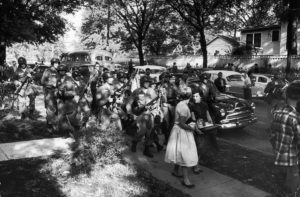
As photographers and bystanders watch, US soldiers walk along a sidewalk behind a pair of Central High school students during the integration crisis, Little Rock, Arkansas, 1957. (Photo by John Bryson/Getty Images)
“One of the lessons of history is that nothing is often a good thing to do and always a clever thing to say.” ~ Will Durant
September 24, 1957: Little Rock Crisis
Although the Civil War had ended nearly a century earlier, the segregation of black and white Americans still continued at this time. Even though, in 1954, the Supreme Court ruled that separating students because of their color was unconstitutional, there were still some areas that refused to comply. This resulted in what is known as the “Little Rock Crisis,” where nine black students tried to attend an all-white school. What followed was a power struggle between the governor of Arkansas and the president of the United States.
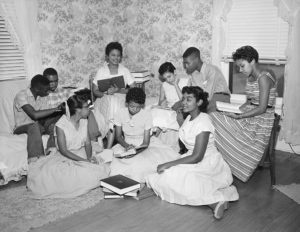
The “Little Rock Nine” form a study group after being prevented from entering Little Rock’s racially segregated Central High School, 13th September 1957. (Getty Images)
The school board had voted to desegregate the state’s schools, including Central High School in Little Rock. However, days before classes began in September, Governor Orval Faubus announced he would bring in the National Guard to prevent black students from attending. On September 4, 1957, the Little Rock Nine, as the black students were called, were met with hostility from students and protesters, and denied entry to the school by the National Guard.
President Dwight D. Eisenhower met with the governor to reach an agreement after a standoff that had lasted for weeks. They agreed to keep the National Guard at the school, but rather than preventing the black students from attending, the guardsmen were supposed to protect them. Instead, Gov. Faubus removed the guards and replaced them with local police. On September 23, the students once again tried to attend classes, but a mob of about 1,000 people gathered outside and a riot began.
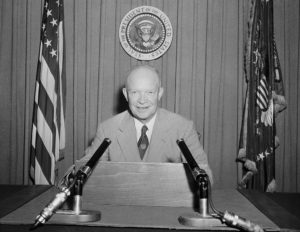
President Dwight Eisenhower. (Getty Images)
President Eisenhower, furious that the governor would disobey him, issued an executive order that brought the Arkansas National Guard under federal authority. He then sent 1,000 Army troops to Little Rock to maintain order at the high school, and on September 24, 1957, the Little Rock Nine were finally able to attend classes.
Other Notable History Mentions
September 18, 1810: After being a colony for 269 years, Chile declared its independence from Spain.
September 18, 1947: The United States Air Force was established as a separate military service.
September 19, 1676: A rebellion led by Nathaniel Bacon attacked and burned Jamestown, Virginia, to fight against Sir William Berkely, the royal governor.
September 19, 1893: New Zealand became the first country to give women the right to vote.
September 19, 1994: After the president of Haiti was overthrown, US troops invaded the island with the goal of restoring democracy.

General view of the much-hyped tennis match in the Astrodome between Bobby Riggs and Billie Jean King, dubbed “The Battle of the Sexes.” (Getty Images)
September 20, 1873: During the financial Panic of 1873, the New York Stock Exchange had to close for the first time in history.
September 20, 1973: The “Battle of the Sexes” happened in the Houston Astrodome between tennis player and women’s rights activist Billie Jean King and male tennis champion Bobby Riggs. King beat Riggs in three straight sets.
September 20, 1989: F.W. de Klerk became president of South Africa.
September 21, 1949: Communist leaders proclaimed China the People’s Republic of China.
September 22, 1776: During the Revolutionary War, Nathan Hale was executed for spying on British troops. His last words are still famous today: “I only regret that I have but one life to lose for my country.”
September 22, 1862: President Abraham Lincoln issued a preliminary Emancipation Proclamation to free slaves held in Confederate states.
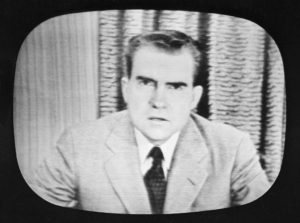
Nixon Delivering “Checkers” Speech. (Getty Images)
September 22, 1862: Otto von Bismarck became the premier of Prussia. He created a confederation of German states with Wilhelm I as the kaiser of the new German Empire.
September 23, 1952: Vice-presidential candidate Richard Nixon spoke to the nation in his Checkers Speech. In the address, he defended himself against accusations of financial misdeeds.
September 23, 1991: Armenia declared independence from the Soviet Union.
September 24, 1980: War began between Iran and Iraq.
Famous Birthdays
Greta Garbo (September 18, 1905) was born in Stockholm, Sweden. An actress, she was born Greta Lovisa Gustafsson and made 27 films, starting with silent movies and moving on to some of the first made with sound.
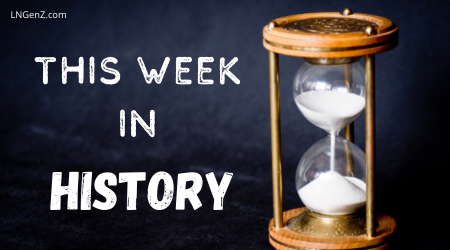
William Golding (September 19, 1911) was born in Cornwall, England. An author, he received a Nobel Prize in 1983 and is most famous for his work, Lord of the Flies.
Michael Faraday (September 22, 1791) was born in Surrey, England. He was a British scientist whose study of electromagnetic forces led to the invention of electric generators.

American puppeteer, inventor, and filmmaker Jim Henson with one of his creations, Kermit the Frog, 1983. (Photo by Brownie Harris/Corbis via Getty Images)
Walter Lippmann (September 23, 1889) was born in New York. A journalist, he is known for saying, “Without criticism and reliable and intelligent reporting, the government cannot govern.”
Friedrich von Paulus (September 23, 1890) was born in Breitenau, Germany. Once a part of Adolf Hitler’s army, he surrendered to the Russians and eventually became a critic of the Nazi regime. He later testified as a witness to help the Russians prosecute Nazis during the Nuremberg war crime trials.
John Marshall (September 24, 1755) was born in Germantown, Virginia. President John Adams appointed him chief justice of the Supreme Court and he became known as “The Great Chief Justice.”
Francis Scott Key Fitzgerald, also known as F. Scott Fitzgerald (September 24, 1755), was born in St. Paul, Minnesota. He is best known for writing The Great Gatsby and Tender is the Night.
Jim Henson (September 24, 1936) was born in Greenville, Mississippi. He created the Muppets, which include Kermit the Frog, Bert and Ernie, and the television show Sesame Street.